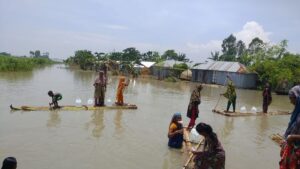After 50 years of providing it support on climate resilience and disaster management, the World Bank feels that Bangladesh needs to continue investments to strengthen climate resilience in the coastal zones to protect the development gains.
In a new report launched Monday, the World Bank says that despite vulnerability to climatic risks, Bangladesh has emerged as a global leader in climate change adaptation and is known for proactively investing in resilience.
“It shows how long-term investments in disaster risk reduction save lives, reduce economic losses, and protect development gains,” the report says.
This was possible due to a range of initiatives backed up by a strategic policy framework, from grassroots-level adaptation and community-based early warning systems to structural investments in infrastructure complemented by nature-based solutions and fostering innovation. Since independence in 1971, Bangladesh has reduced cyclone-related fatalities by 100-fold.
The report, “Bangladesh: Enhancing Coastal Resilience in a Changing Climate” highlights the country’s journey to reducing vulnerability to climate change and recommends further actions towards improving the resilience of its coastal region.
The report analyses the drivers of risks and examines how government initiatives have reduced these risks and offers new perspectives and innovative solutions.

Invest in coastal resilience
Yet, the report says that a rapidly growing population, environmental degradation, and increasing climate risks are putting pressure on the existing natural and infrastructure systems in the coastal zone, home to about 40 million people.
This report, complementing the forthcoming Bangladesh Country Climate and Development Report (CCDR), says that Bangladesh needs to take further immediate actions to improve resilience, the report emphasises.
The CCDR is the World Bank Group’s new diagnostic report that integrates climate change and development considerations.
The report says that further investments in coastal resilience would produce an array of economic, social, and environmental benefits for Bangladesh.
It lays out seven key recommendations to strengthen the resilience of the coastal region, including strengthening the operation and maintenance of infrastructure; recognising local knowledge; and utilising state-of-art modelling tools.
Given the changing climate and dynamic coastal processes, a risk management framework should act as the guiding principle for adaptive delta management.
Infrastructure investments need to be complemented with nature-based solutions. The coastal area can benefit from inclusive community participation and livelihood adaptation for sustainable resilience.

